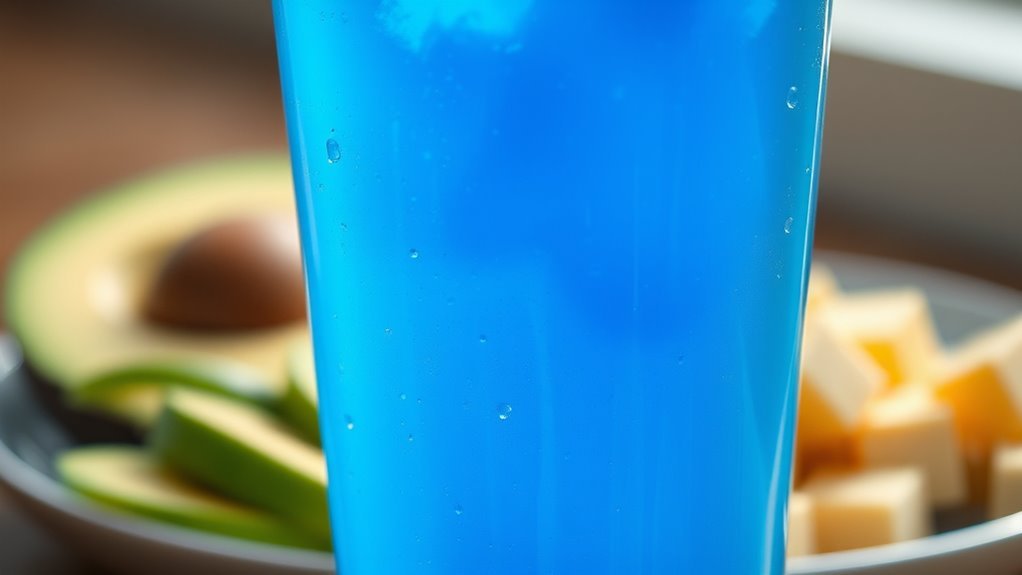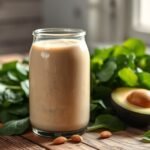Gatorade isn’t typically considered keto-friendly due to its high carbohydrate content, with around 21 grams of carbs per 12 oz. This amount can disrupt ketosis for those following a strict ketogenic diet. If you’re looking for hydration alternatives, options like Gatorade Zero or electrolyte powders are better suited for keto. Understanding your hydration needs and making informed choices can help you stay on track. Explore more about suitable hydration strategies and alternatives.
Understanding the Ketogenic Diet
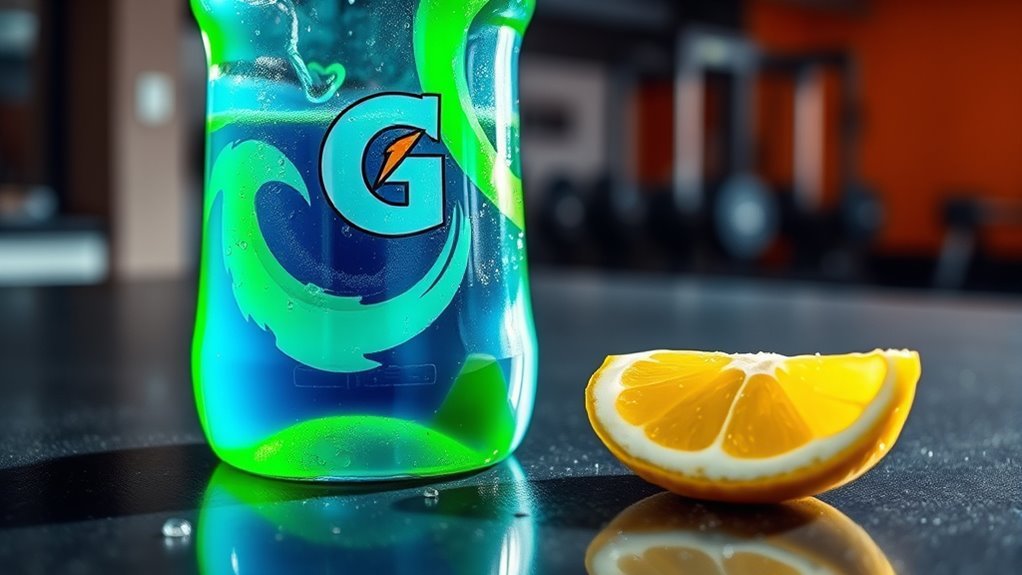
While many diets promote quick weight loss, the ketogenic diet stands out due to its unique focus on macronutrient ratios. By greatly reducing carbohydrate intake and increasing fats, you’ll encourage your body to enter ketosis, a metabolic state that burns fat for energy. This shift can lead to impressive keto benefits, including improved mental clarity and sustained energy levels. Meal planning is essential in this diet; it helps you maintain the right ratios and avoid high-carb temptations. Emphasizing whole, nutrient-dense foods like avocados, nuts, and leafy greens can support your journey. Ultimately, the ketogenic diet offers a structured approach that not only promotes weight loss but also enhances your overall well-being, allowing you to embrace a more liberated lifestyle.
Nutritional Breakdown of Gatorade
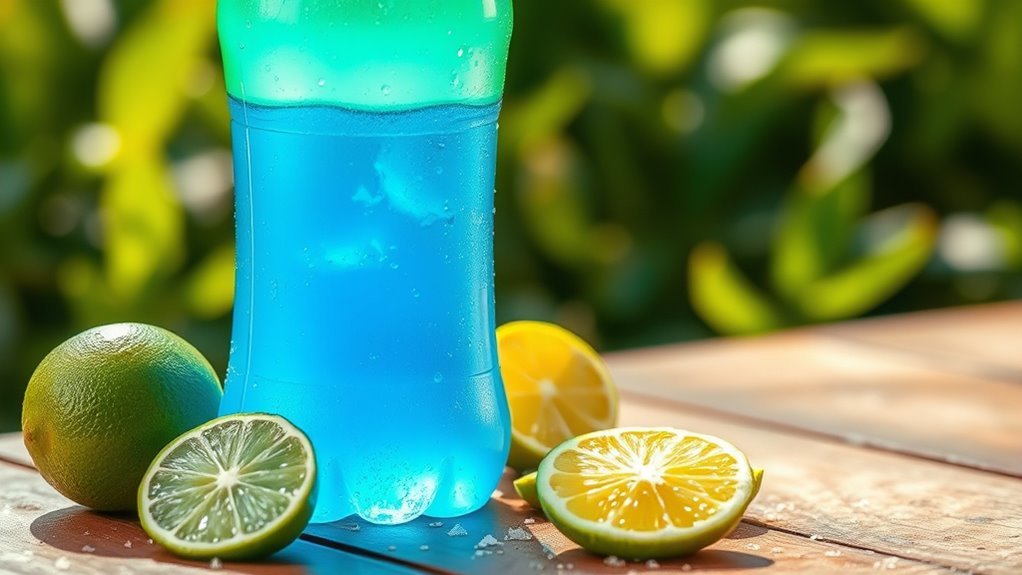
When you examine Gatorade’s nutritional profile, you’ll notice its carbohydrate content plays a significant role, especially for those on a keto diet. The drink also contains essential electrolytes, which are vital for hydration and performance, but the types of sugar used can impact your overall carb intake. Understanding these components will help you make a more informed choice about whether Gatorade aligns with your dietary goals.
Carb Content Analysis
Gatorade, often regarded as a go-to sports drink for hydration and electrolyte replenishment, contains a significant amount of carbohydrates that can impact those following a ketogenic diet. If you’re considering Gatorade while on keto, here’s a quick carb content analysis:
- Standard Gatorade: Typically contains about 14 grams of carbs per 8-ounce serving.
- Gatorade Zero: A lower-carb alternative with zero sugar and fewer than 1 gram of carbs.
- Gatorade alternatives: Consider options like coconut water or electrolyte tablets that might fit better into your hydration strategies without disrupting ketosis.
Understanding these carb counts can help you make informed choices about your hydration while staying true to your dietary goals.
Electrolyte Composition
Understanding the carbohydrate content of Gatorade is just one part of the equation; its electrolyte composition plays a significant role in its effectiveness as a sports drink. Gatorade contains important electrolytes like sodium, potassium, and chloride, which help maintain electrolyte balance during intense physical activity. This balance is crucial for muscle function and proper hydration strategies. When you sweat, you lose these electrolytes, and consuming Gatorade can help replenish them, aiding in quicker recovery and sustained performance. However, it’s important to take into account your overall dietary intake, especially if you’re following a keto lifestyle, as excessive carbs can disrupt your goals. Evaluating Gatorade’s electrolyte composition can help you make informed choices for best hydration.
Sugar Variants
Although Gatorade is well-known for its electrolyte replenishment, its sugar content is an important factor to take into account, especially for those on a keto diet. Traditional Gatorade contains high amounts of sugar, which can hinder your ketogenic goals. Here’s a breakdown of the alternatives you might consider:
- Sugar Substitutes: Products like erythritol or stevia can provide sweetness without the carbs.
- Natural Sweeteners: Honey or agave might be more natural but still contain sugars that can impact ketosis.
- Low-Sugar Variants: Some Gatorade options have reduced sugar, but always check the labels.
If you’re serious about maintaining ketosis, understanding these sugar variants is important for making informed choices.
Carbohydrate Content in Gatorade
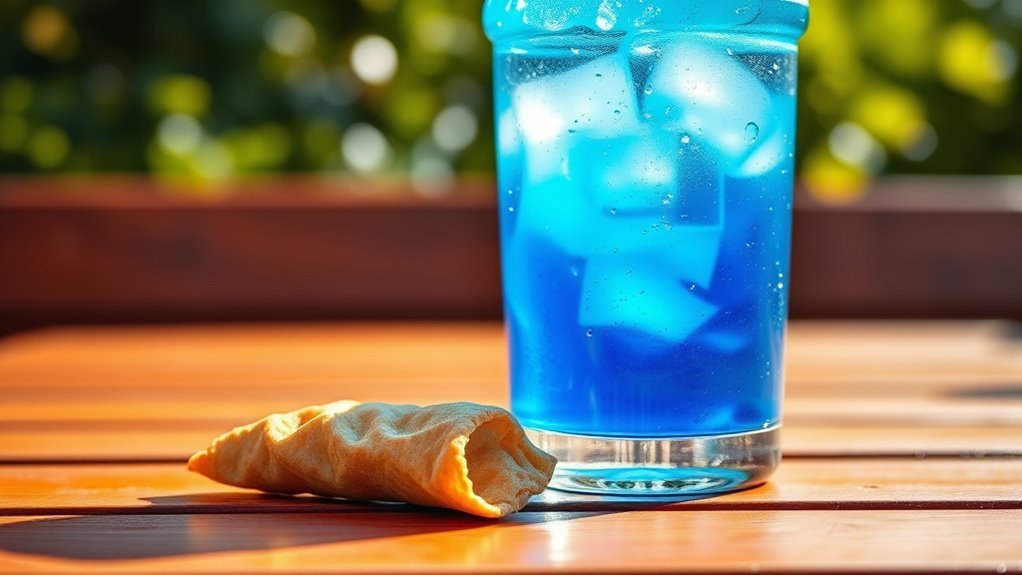
When evaluating sports drinks for a ketogenic diet, the carbohydrate content is an important factor to take into account. Gatorade, while popular for hydration, contains significant carbs that can disrupt ketosis. Here’s a quick comparison of Gatorade’s carbohydrate content against some alternatives:
| Drink | Carbohydrates (g) per 12 oz | Keto-Friendly |
|---|---|---|
| Gatorade | 21 | No |
| Gatorade Zero | 0 | Yes |
| Coconut Water | 9 | No |
| Electrolyte Powder | 1 | Yes |
| Water | 0 | Yes |
Considering Gatorade alternatives and effective hydration strategies is vital if you’re committed to staying in ketosis. Always check labels to confirm you’re making informed choices.
Electrolytes and Hydration on Keto
How can you maintain proper hydration and electrolyte balance on a ketogenic diet? Staying hydrated is vital for your well-being, especially on keto, where electrolyte depletion can occur. Here are three strategies to guarantee ideal keto hydration and maintain electrolyte balance:
- Increase Sodium Intake: Add salt to your meals or drink broth to replenish sodium levels, which can drop on keto.
- Stay Hydrated: Aim for at least 8-10 cups of water daily. Consider electrolyte-infused water for added benefits.
- Supplement Wisely: Use potassium and magnesium supplements to prevent cramps and fatigue, common side effects of low electrolytes.
Gatorade’s Impact on Ketosis
Maintaining hydration and electrolyte balance on a ketogenic diet often leads individuals to explore various beverage options, including Gatorade. While Gatorade provides essential electrolytes, it’s important to note its high sugar content, which can hinder your state of ketosis. Consuming even a small amount could spike insulin levels, potentially disrupting fat-burning processes. Therefore, if you’re committed to a keto lifestyle, consider Gatorade alternatives like electrolyte powders or sugar-free drinks that offer similar benefits without the carbs. Hydration strategies should focus on low-carb options to maintain electrolytes while supporting your keto goals. Monitoring your intake enables you to stay in ketosis while enjoying effective hydration solutions tailored to your dietary needs.
Comparing Gatorade to Other Sports Drinks
When you compare Gatorade to other sports drinks, you’ll notice significant differences in carb content, which can impact your fitness goals. Additionally, the electrolyte profiles vary, affecting hydration and recovery. Plus, Gatorade offers a wider range of flavor options, making it a popular choice for many athletes.
Gatorade’s Carb Content
Gatorade contains about 14 grams of carbohydrates per 8-ounce serving, which is considerably higher than many other sports drinks on the market. This higher carb content can impact your hydration strategies, especially if you’re following a keto diet. Here’s how Gatorade compares to some alternatives:
- Powerade: Only has about 13 grams of carbohydrates per serving, making it a slightly lower-carb option.
- BodyArmor: Packs around 18 grams of carbohydrates, primarily from natural carbohydrate sources.
- Coconut Water: Contains about 9 grams of carbohydrates, presenting a more keto-friendly choice.
When considering your options, it’s crucial to evaluate how these carbohydrate sources align with your hydration needs and dietary goals.
Electrolyte Comparison
While many athletes rely on sports drinks to replenish lost electrolytes, it’s essential to compare their effectiveness. Gatorade, with its blend of sodium and potassium, is designed to support electrolyte balance during intense activities. However, other options like Nuun and electrolyte powders offer lower sugar content and customizable hydration strategies, which can be appealing for those mindful of their carb intake. For instance, electrolyte-enhanced waters often contain minimal calories, making them suitable for keto enthusiasts. When selecting a drink, consider your activity level and personal health goals. Ultimately, understanding the differences in electrolyte content can empower you to make informed decisions about your hydration strategies, ensuring peak performance without compromising your dietary preferences.
Flavor Options Available
A wide variety of flavor options can greatly influence your choice of sports drinks, especially when comparing Gatorade to its competitors. Gatorade flavors include classics like Lemon-Lime and Fruit Punch, but they also offer unique options like Glacier Freeze and Cool Blue. When evaluating flavor healthiness, it’s essential to reflect on sugar content and artificial ingredients, as these can impact your overall health goals.
Here’s a quick comparison:
- Gatorade: Offers a wide range of flavors, often with added electrolytes.
- Powerade: Similar flavors but typically contains more sugar.
- BodyArmor: Uses coconut water, providing a more natural flavor profile.
Ultimately, your choice may depend on personal taste and nutritional preferences.
Keto-Friendly Alternatives to Gatorade
Finding suitable alternatives to traditional sports drinks can be crucial for those following a ketogenic diet, especially when you need to maintain hydration and electrolyte balance. Fortunately, there are several keto beverage options that can help you achieve this. Electrolyte-infused waters and homemade electrolyte drinks made with coconut water, lemon juice, and a pinch of salt provide essential minerals without the carbs. Additionally, sugar-free electrolyte powders can be mixed with water for a quick hydration strategy. Herbal teas and bone broth are also excellent options, offering hydration and nutrients without compromising your keto lifestyle. By incorporating these alternatives, you can guarantee you’re meeting your hydration needs while enjoying freedom from high-carb beverages.
When to Use Gatorade in Your Diet
If you’re weighing when to incorporate Gatorade into your diet, it’s important to understand the specific scenarios where it can be beneficial. Effective Gatorade usage hinges on your activity level and hydration strategies. Here are three situations to weigh:
Understanding when to use Gatorade is key, especially during intense workouts, hot weather, or post-illness recovery.
- Intense Workouts: If you’re engaging in prolonged, high-intensity exercise, Gatorade can help replenish lost electrolytes and maintain energy levels.
- Hot Weather: During extreme heat, Gatorade aids in hydration by replacing electrolytes lost through sweat.
- Post-Illness Recovery: If you’ve been sick, Gatorade can help restore hydration and essential minerals, aiding your recovery.
Personalizing Your Hydration Strategy
To personalize your hydration strategy, it’s important to understand your specific electrolyte needs, especially on a keto diet. You should choose low-carb options to maintain ketosis while ensuring you’re replenishing essential minerals lost through sweat. Additionally, timing your hydration can greatly impact your performance and recovery, making it imperative to align your fluid intake with your activity levels.
Understanding Electrolyte Needs
Electrolytes play an essential role in maintaining hydration, especially for those following a ketogenic diet. Achieving electrolyte balance is critical since low-carb diets can lead to increased excretion of these essential minerals. To personalize your hydration strategies, consider the following:
- Sodium: Guarantee adequate intake to support muscle function and fluid balance.
- Potassium: Helps regulate nerve function and muscle contractions; consider foods like avocados and leafy greens.
- Magnesium: Important for energy production and muscle relaxation; look for nuts, seeds, and dark chocolate.
Choosing Low-Carb Options
How can you effectively choose low-carb options to stay hydrated on a ketogenic diet? Start by opting for beverages that are low in carbohydrates, like water, unsweetened tea, or electrolyte-infused drinks specifically designed for keto. You can enhance hydration with low-carb snacks such as cucumber slices or celery sticks, which also provide hydration benefits. Remember, staying hydrated isn’t just about water; it’s about balancing electrolytes too. Look for drinks with added minerals like potassium and magnesium, avoiding sugar-laden sports drinks. When selecting your hydration strategy, aim for products with clear ingredient lists and minimal carbs. By integrating these hydration tips into your routine, you’ll maintain energy levels while enjoying the freedom of your keto lifestyle.
Timing Your Hydration
While staying hydrated is essential on a ketogenic diet, the timing of your hydration can greatly impact your overall well-being and energy levels. Proper hydration timing can enhance performance, especially during exercise. Here are three tips to optimize your hydration:
- Pre-Workout: Drink water 30-60 minutes before exercising to prepare your body for increased exercise intensity.
- During Exercise: Sip water or electrolyte solutions, especially if your workout exceeds an hour, to maintain hydration levels.
- Post-Workout: Rehydrate within 30 minutes after exercising to replenish lost fluids and support recovery.
Making Informed Choices for Hydration
When considering your hydration options, it’s vital to ask yourself what truly meets your needs, especially if you’re following a keto diet. Traditional sports drinks like Gatorade often contain sugars that can disrupt ketosis, making them less suitable for you. Instead, focus on hydration strategies that align with your dietary goals, such as electrolyte-infused water or homemade electrolyte drinks. These alternatives can help maintain your fitness performance without compromising your keto principles. Monitoring your hydration levels is essential, as proper hydration can enhance your energy and recovery. Embrace the freedom to choose what nourishes your body, ensuring you stay hydrated while sticking to your keto lifestyle. Remember, informed choices lead to better health outcomes and improved athletic capabilities.
Frequently Asked Questions
Can I Drink Gatorade While Intermittent Fasting?
You shouldn’t drink Gatorade while intermittent fasting. Even though it can help with hydration strategies, it contains sugars and calories that break your fast. If you’re looking to maintain the benefits of fasting, stick to water or zero-calorie beverages. Hydration is essential, but it’s best to choose options that won’t interfere with your fasting goals. Staying informed about what you consume is key to achieving your health objectives during intermittent fasting.
What Flavors of Gatorade Are Available?
Gatorade offers a wide array of flavor varieties and color options to suit your taste. You can find classics like Lemon-Lime and Orange, alongside newer options such as Glacier Freeze and Strawberry-Watermelon. Additionally, they have unique flavors like Fierce Melon and Arctic Blitz. Each flavor is designed to provide hydration and energy during workouts. So, whether you prefer fruity, tangy, or something a bit different, there’s likely a Gatorade flavor that meets your needs.
Is Gatorade Suitable for Children on a Keto Diet?
Gatorade isn’t the best choice for kids on a keto diet. While it hydrates like a miracle potion, its high sugar content can derail keto benefits. For child hydration, consider alternatives like electrolyte water or homemade drinks using low-carb sweeteners. These options can keep your child hydrated without compromising their diet. Always consult a healthcare professional to guarantee your child’s nutritional needs are met while enjoying the freedom of a keto lifestyle.
Can I Mix Gatorade With Alcohol on Keto?
You can mix Gatorade with alcohol, but it isn’t the best choice for a keto diet. Gatorade cocktails typically contain sugar, which can kick you out of ketosis. If you’re looking for keto-friendly mixers, consider options like sparkling water or unsweetened beverages. These alternatives can keep your carb count low while still allowing you to enjoy a revitalizing drink. Balance is key, so be mindful of what you’re mixing!
Does Gatorade Contain Any Artificial Sweeteners?
Yes, Gatorade does contain artificial ingredients, but it typically doesn’t use artificial sweeteners. Instead, it relies on sugar and sugar alternatives to enhance its taste. If you’re looking for hydration options without artificial additives, consider checking the labels for specific products, as formulations can vary. Understanding what you’re consuming gives you more freedom to make choices that align with your health goals while still enjoying sports beverages.
Frequently Asked Questions about Gatorade and Keto
Is Gatorade keto-friendly?
Gatorade is not typically considered keto-friendly because it contains a significant amount of sugar. Most varieties of Gatorade have about 14 grams of sugar per 12-ounce serving, which can quickly exceed the daily carb limit for those on a ketogenic diet, typically set at around 20-50 grams of net carbs per day.
What are the carb contents of Gatorade?
The carbohydrate content in Gatorade varies by flavor and version, but most standard Gatorade drinks contain about 14 grams of carbohydrates per 12-ounce serving, primarily from sugar. Some sugar-free versions, like Gatorade Zero, have little to no carbohydrates, making them a better choice for those on a keto diet.
Can I drink Gatorade while on a ketogenic diet?
If you’re on a ketogenic diet, you need to be cautious with Gatorade. The regular versions contain high levels of sugar, which can disrupt ketosis. However, Gatorade Zero and other low-carb electrolyte drinks can be consumed in moderation as they are designed to be low in carbohydrates and sugars, helping to maintain electrolyte balance without kicking you out of ketosis.
What alternatives to Gatorade are better for keto?
There are several alternatives to Gatorade that are more suitable for a ketogenic diet, such as electrolyte drinks that are specifically formulated for low-carb diets. Brands like Ultima Replenisher and LMNT offer electrolyte powders that contain little to no carbohydrates and are sweetened with stevia or other keto-friendly sweeteners. You can also make your own electrolyte drink at home using water, salt, lemon juice, and a sugar-free electrolyte supplement.
Will drinking Gatorade affect my ketosis?
Yes, drinking regular Gatorade can affect your ketosis due to its high sugar content. Consuming more carbs than your body can handle while in ketosis can lead to the body exiting the ketosis state, which is the main goal of a ketogenic diet. If you want to maintain ketosis, it’s essential to monitor your carb intake and choose low-carb alternatives.
References
- https://www.ncbi.nlm.nih.gov/pmc/articles/PMC7036840/
- https://www.healthline.com/nutrition/keto-diet-foods
- https://www.webmd.com/diet/what-to-know-about-keto-diet
- https://www.mayoclinic.org/healthy-lifestyle/nutrition-and-healthy-eating/expert-answers/keto-diet/faq-20459079
- https://www.verywellfit.com/keto-diet-4690480
- https://www.hopkinsmedicine.org/health/wellness-and-prevention/the-ketogenic-diet-what-you-need-to-know
- https://www.cdc.gov/healthyweight/healthy_eating/index.html
